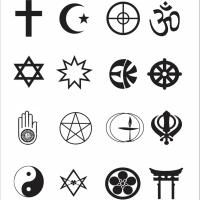Religion is usually defined as a social-cultural system of designated behaviors and practices, morals, beliefs, worldviews, texts, sanctified places, prophecies, ethics, or organizations, that generally relates humanity to supernatural, transcendental, and spiritual elements;[1] however, there is no scholarly consensus over what precisely constitutes a religion.[2][3] Different religions may or may not contain various elements ranging from the divine,[4] sacred things,[5] faith,[6] a supernatural being or supernatural beings[7] or "some sort of ultimacy and transcendence that will provide norms and power for the rest of life".
Religion is usually defined as a social-cultural system of designated behaviors and practices, morals, beliefs, worldviews, texts, sanctified places, prophecies, ethics, or organizations, that generally relates humanity to supernatural, transcendental, and spiritual elements;[1] however, there is no scholarly consensus over what precisely constitutes a religion.[2][3] Different religions may or may not contain various elements ranging from the divine,[4] sacred things,[5] faith,[6] a supernatural being or supernatural beings[7] or "some sort of ultimacy and transcendence that will provide norms and power for the rest of life".
Religion is usually defined as a social-cultural system of designated behaviors and practices, morals, beliefs, worldviews, texts, sanctified places, prophecies, ethics, or organizations, that generally relates humanity to supernatural, transcendental, and spiritual elements;[1] however, there is no scholarly consensus over what precisely constitutes a religion.[2][3] Different religions may or may not contain various elements ranging from the divine,[4] sacred things,[5] faith,[6] a supernatural being or supernatural beings[7] or "some sort of ultimacy and transcendence that will provide norms and power for the rest of life".















